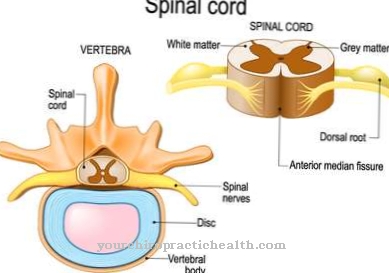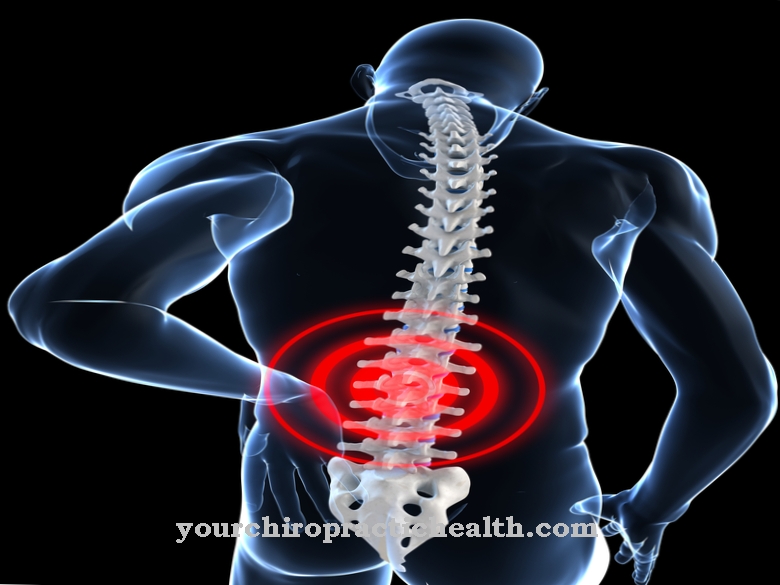Overexertion is a consequence of increased stress with insufficient recovery. This can affect the body or part of the body. Overexertion can also arise in the mental area or in the psyche.
What is overexertion?
The term "overexertion" encompasses a multitude of different forms of physical and mental overload. The causes vary from person to person. Over-exertion can manifest itself through poor concentration, increased blood pressure, tremors, nausea, pain, stomach symptoms and pressure in the head and neck.
Mental or mental exhaustion with a lack of rest time also leads to overexertion. Overexertion happens after a period of excessive work with a lack of energy balance. Overexertion can be accompanied by a breakdown of the autonomic nervous system. One of the consequences is easing tension in the vessel walls. Overloading the body always goes hand in hand with hyperacidity. Excessive muscle tension without slackening the muscles creates acid in the body.
Pain in the joints and muscles is the result. The overexertion results from an exertion beyond an acceptable level. Burnout or depression can be forms or consequences of overexertion. Civilization and prosperity have increased the extent of overexertion. Mental and physical exhaustion often come together.
causes
The overexertion is often the result of overwork. Overwork in sports is also not uncommon. Mental, psychological and physical reasons are also possible causes. In the case of work overload, the pressure of things to do is an important indicator.
The overload leads to disturbed sleep and the necessary relaxation. If there is no relaxation, gastrointestinal symptoms are often added. These can be a burning stomach, gastritis, or diarrhea. A need for rest of the body and mind is ignored. The body reacts with increased insulin release. The body reacts to the overuse by adjusting blood pressure.
Loss of fluids and insufficient nutrition also occur.Exertion and tension in the form of stress can lead to burnout syndrome. Exercise often comes together with other worries. The pressure of strenuous work with few resources to relax burns people out. At management level, exhaustion often results from over-identification with the position.
Despite material independence, there is insufficient free time. This also means that deep, relaxing sleep is neglected here. Another cause can be a desire for perfection. Mentally, the person concerned cannot switch off enough. Physically speaking, overexertion burns the body out. Overexertion in pregnancy is a common form.
Symptoms, ailments & signs
Overexertion of the human body can arise and be caused by many different factors. For older people, a small amount of physical activity is often enough to overwork the body. In most cases, the human body makes itself felt with fairly clear symptoms that indicate overexertion.
Excessive sweating, for example, is a fairly clear symptom that indicates overexertion. The flow of sweat can then be seen in places that are rather untypical for sweat formation. This means the back, the stomach or the surface of the arms. The blood pressure also increases significantly when overexertion, so that affected people can suffer from palpitations.
Individual limb tremors can also be a fairly clear symptom of overexertion. Often people also complain of prolonged nausea, headaches or diarrhea. If you want to alleviate the symptoms that occur, you should immediately take a break. If the above symptoms persist after that, you should see a doctor as soon as possible.
There is a risk of a serious underlying disease, so a visit to the doctor is essential. Anyone who refrains from medical or drug treatment must expect the symptoms mentioned above to worsen considerably.
Diagnosis & course
An overload of mental and physical strength usually happens slowly. The manifested state can be recognized by a sum of various diagnostic features. A hypoglycemia is often diagnosed.
Overexertion can result in circulatory collapse or high blood pressure. The first signs are lack of sleep, lack of concentration and stress symptoms. In this state, diagnosis is easy. The person concerned has shadows around the eyes and appears nervous and unfocused. The breathing rhythm is shortened and puffing slightly. Nausea and headache are symptoms to watch out for. You have to react accordingly.
Blood pressure can rise above normal. Exhaustion can lead to sudden fainting. A distinction must be made between physical and mental-mental overwork. The physical overexertion is often found as a result of a sporting competition. The mental overhaul happens more in everyday company life. The course of the disease is slower in this case. In everyday company life, the course of the illness shows through stress and excessive commitment. Failure to comply could result in complete burnout.
Complications
Acute overexertion usually does not result in long-term complications. The person concerned usually feels exhausted and overtired and may suffer from a high pulse. If these complaints are not treated, the sense of well-being decreases relatively quickly and psychological complaints develop. In addition, there are acute symptoms such as dehydration or headaches, which, if not treated, can lead to serious complications.
Persistent exhaustion can lead to sudden fainting, which is fraught with complications and the risk of falling. If there is already a physical illness, overexertion can lead to a heart attack in the worst case. If the overexertion lasts for a long time, there is a risk of burnout syndrome, which is associated with weakness, thoughts of fear and increasing mental exhaustion.
If the chronic overexertion is not treated by then at the latest, this can lead to serious mental illnesses and permanent damage to the person concerned. Apart from any side effects and interactions with the prescribed medication, the treatment does not involve any major risks. However, a sudden decrease in stress can lead to so-called leisure sickness - an illness that manifests itself in flu, infections and other ailments.
When should you go to the doctor?
If, after intense sporting activity or strenuous activity, states of fatigue or a decrease in physical performance occur, sufficient rest and rest should be taken. Often there is also sore muscles or a painful condition coils. In most cases, a doctor is not required if the symptoms have been significantly alleviated after a restful night's sleep at the latest.
If the physical irregularities continue to decrease over several hours or days, symptoms will usually be free within a short period of time. In the future, the physical strain should be better adapted to the requirements of the organism. Long-term overexertion can lead to illness or irreversible damage. If painful conditions increase in intensity or if they last for a long time, action is required. In addition, if there are permanent restrictions on the freedom of movement, paralysis or reduced well-being, you should also consult a doctor.
During periods of overexertion, there is often an increase in blood pressure, an increase in heart rate and breathing. These abnormalities should reduce again within a few minutes. You do not need to be examined or treated by a doctor. However, if the person concerned experiences persistent irregularities in the heart rhythm, or if fatigue occurs very quickly shortly after starting physical activity, it is advisable to see a doctor.
Doctors & therapists in your area
Treatment & Therapy
The most effective remedy for overexertion seems to be the middle path. The first signs of mental and physical exhaustion can be noticed early on. In the acute state of exhaustion, sleep, fluids, food, rest and space are the best therapy.
You should react immediately to hypoglycaemia. The same applies to a possible faint. In the case of hypoglycaemia, you should ensure that you drink enough fluids and eat more easily. In the event of fainting, the person affected is placed on the stable side position and the emergency doctor is notified.
The most effective treatment is short or long according to the lead time to the disease. Long-term overhaul in working life must also be treated over the long term. Possible manual therapies come along with the necessary administration of medication. Psychological support to change the rhythm of life may also be indicated.
You can find your medication here
➔ Medicines for relaxation and nerve strengtheningprevention
Take regular breaks. Make sure you get enough sleep. Go to bed early. Walk for 20 minutes a day. Delegate work to colleagues. Spending time with friends and family. Make sure you drink enough fluids.
Let times of relaxation follow times of tension. Enjoy positive stress and avoid negative stress. Know your own limits. Listening to the needs of the body. Psychological support is advisable to prevent future overburdening. The person concerned must learn to manage his or her strength.
You can do that yourself
Overexertion can occur suddenly, or it can appear over the course of weeks. It can occur in individual cases or it can recur. If there is no previous experience with this disease, it can affect those affected without prior notice. Open communication with fellow human beings is of the utmost importance here, so that overexertion is taken seriously. Now only rest, sleep and distance from the triggering factors, for example work.
Under certain circumstances, the accompaniment of a therapist can be helpful. Overworked people are also often overly sensitive to loud noises or large crowds. These should be avoided. If you suffer from this disease chronically or if it occurs more frequently, the first symptoms can usually be foreseen early. Those affected can act before the breakdown occurs. If overexertion becomes apparent, it is helpful to immediately seek relief for everyday life. Furthermore, the person affected can consider whether he should change fundamental things in his life, as these represent more stress than enrichment.
Overexertion should be taken seriously. It is important that those affected do not compare themselves to others. Certain ways of life or a certain workload have different stressful effects on people. Consideration for one's own needs and self-acceptance play an important role here.


.jpg)


.jpg)






.jpg)



.jpg)










.jpg)
